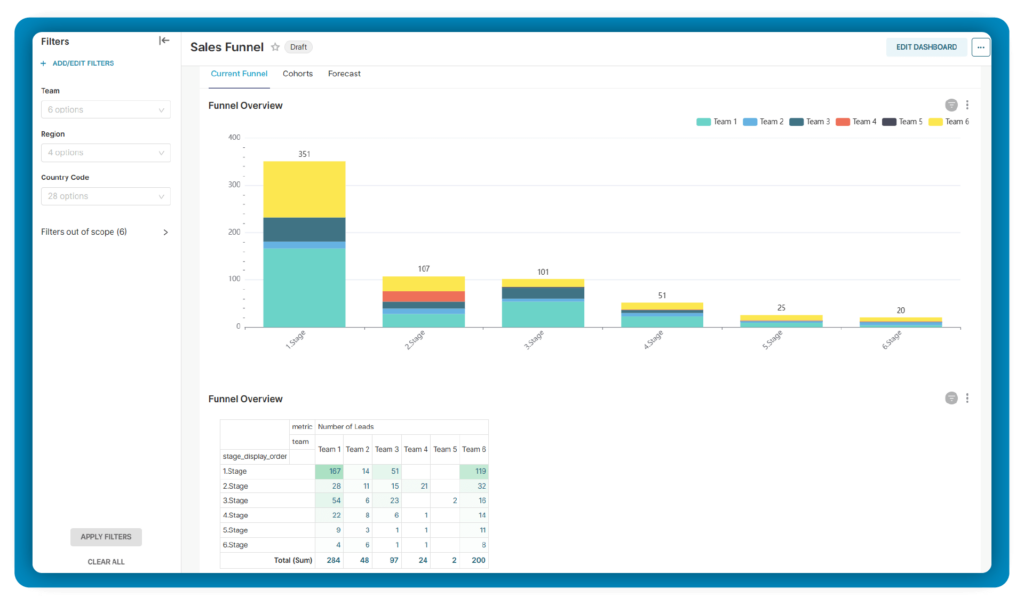In sales-driven organizations, revenue forecasting plays a crucial role in driving business growth and success. Revenue forecasting relies heavily on accurate sales forecasting, which in turn depends on effective sales pipeline management. A well-managed sales pipeline provides valuable insights into the sales process, enabling businesses to make informed decisions and predict future revenue with greater accuracy. In this article, we will explore why revenue forecasting is essential for businesses and delve into the key components of good sales pipeline management.

Why is Revenue Forecasting Important for Businesses?
1. Predicting Financial Performance
Accurate revenue forecasting allows businesses to anticipate their future financial performance. By analyzing historical sales data, market trends, and other relevant factors, organizations can make informed decisions regarding budgeting, resource allocation, and goal setting. Moreover, revenue forecasting enables businesses to set realistic targets and track progress towards achieving them.
2. Resource Planning and Allocation
A clear understanding of revenue projections helps businesses allocate their resources effectively. Whether it’s determining staffing levels, investing in marketing initiatives, or managing inventory, revenue forecasting provides insights that enable organizations to optimize their resource allocation. This prevents overinvestment or underinvestment in critical areas and ensures resources are allocated where they are most needed.
3. Identifying Growth Opportunities
Revenue forecasting helps businesses identify potential growth opportunities and devise strategies to capitalize on them. By analyzing sales patterns, customer behavior, and market trends, organizations can identify emerging markets, target specific customer segments, and adapt their sales strategies accordingly. Accurate revenue forecasting enables businesses to seize growth opportunities swiftly, gaining a competitive edge in the market.

What is Important to Have a Good Sales Pipeline Management?
1. Clear and Defined Stages
A well-structured sales pipeline consists of clearly defined stages that reflect the progression of a lead from initial contact to final sale. Each stage should have specific criteria and actions associated with it, enabling sales teams to track and manage leads effectively. Clear stages facilitate accurate forecasting, as they provide a snapshot of where each lead stands in the sales process.
2. Accurate Data Tracking and Analysis
To ensure effective sales pipeline management, it is crucial to track and analyze data throughout the sales cycle. This includes monitoring lead sources, conversion rates, deal sizes, and win/loss ratios. Accurate data tracking allows businesses to identify bottlenecks, spot trends, and make data-driven decisions to optimize the sales process. Sales teams can proactively address challenges, refine strategies, and improve overall performance.
3. Collaboration and Communication
Effective sales pipeline management requires collaboration and communication among different teams, such as marketing, sales, and customer service. Sales representatives need to provide regular updates on leads and customer interactions, while marketing teams should share insights on campaign performance and lead generation efforts. Transparent communication ensures everyone is aligned, reduces duplication of efforts, and enhances overall efficiency.
4. Regular Review and Adjustments
A good sales pipeline management system is not static; instead, it requires regular review and adjustments. By analyzing historical data, identifying trends, and assessing performance metrics, businesses can refine their sales pipeline stages, criteria, and strategies. This iterative process allows for continuous improvement, ensuring that the sales pipeline remains relevant and effective in meeting business objectives.


Conclusion
In sales-driven organizations, revenue forecasting is of paramount importance for business growth and success. Accurate revenue forecasts enable businesses to predict financial performance, allocate resources effectively, identify growth opportunities, and attract investors. However, achieving accurate revenue forecasting heavily relies on good sales pipeline management.
If you’re looking for a comprehensive data platform to support your sales performance management and revenue forecasting needs, we recommend checking our Sales Performance Management. Qmantic offers a robust solution that empowers your businesses to track and analyze sales data, gain valuable insights, and make data-driven decisions.
Furthermore, delve into the realm of Qmantic, to learn more about how our platform can help you streamline your sales pipeline management and improve your revenue forecasting accuracy.





